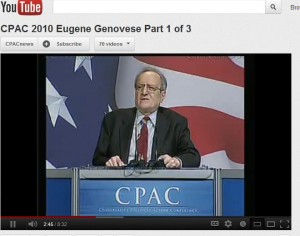Eugene D. Genovese, a charter member of the Alexander Hamilton Institute for the Study of Western Civilization’s (AHI) Board of Academic Advisers and one of the most influential historians of his generation, passed away at his home in Atlanta on September 26. He was eighty-two years of age. He taught at Rutgers University; Sir George Williams in Montreal, Canada; the University of Rochester; Princeton University, and Emory University. In the 1970s, as chairman of the department, he built the graduate program in history at the University of Rochester into one of the finest in the country. While there, he mentored AHI Charter Fellows Douglas Ambrose and Robert Paquette.
No historian during the last fifty years had a greater impact on the study of masters and slaves in the Old South than Genovese. His Roll, Jordan, Roll: The World the Slaves Made (1974) won the Bancroft Prize. More recently he and his late wife Elizabeth Fox-Genovese, also a charter member of the AHI’s Board of Academic Advisers, co-authored an impressive trilogy of related work: The Mind of the Master Class: History and Faith in the Southern Slaveholders’ Worldview (2005), Slavery in White and Black: Class and Race in the Southern Slaveholders’ New World Order (2008), and Fatal Self-Deception: Slaveholding Paternalism in the Old South (2011).
Genovese started out his academic career as a Marxist scholar who had been expelled from the Communist Party at age twenty. In the 1990s he shifted rightward, denouncing in the journal Dissent the crimes of Communism for breaking “all records for mass slaughter.” He also returned to the Catholic Church. In his last major public appearance in 2010, Genovese received the Jeane Kirkpatrick Academic Freedom Award from the Conservative Political Action Conference. In his acceptance speech, Genovese sharply criticized the current state of higher education in the United States, citing a breathtaking collapse of academic standards and the cowardice of academic leaders who stood by and watched the dismantling by faculty activists of core curricula centered in Western culture.
In 2000 Paquette co-edited a volume, Slavery, Secession, and Southern History in honor of Genovese. “During his career as a professional historian,” Paquette wrote, “Eugene Genovese inspired many, learned from others, admitted mistakes, remained steadfast on principle, and moved on when the evidence could no longer support a previous position.” His scholarship will stand the test of time. If in the beginning, he bowed to no God but truth, he ended his life bowing to both.


Leave A Comment